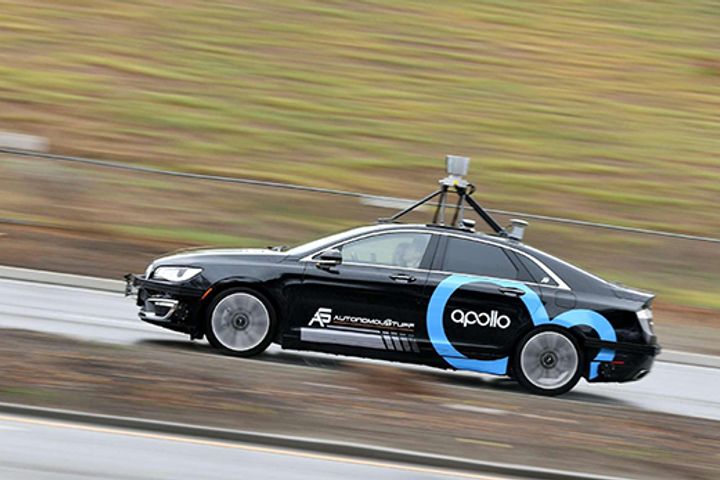 Baidu Kicks Off Test Drive for Apollo 2.0-Installed Autonomous Cars in Silicon Valley
Baidu Kicks Off Test Drive for Apollo 2.0-Installed Autonomous Cars in Silicon Valley(Yicai Global) Jan. 8 -- China's tech giant Baidu Inc. has opened its development and research center in Sunnyvale, California, to the press on Jan. 6, offering reporters a test ride with its self-driving cars installed with Apollo 2.0, the company's latest version of autonomous driving platform software.
Baidu unveiled the research and development center in Sunnyvale two months ago as its third R&D facility in the US and as its second office in Silicon Valley. Unlike the first two offices, the center is dedicated to driving automation development, the most competitive area of artificial intelligence research in the world today.
The vehicles are capable of autonomous driving in a simple urban environment, and can perform various operations including changing lanes, stopping at red traffic lights, ovetaking and turning without any manual input, said Wang Jingao, head of the platform development team.
A Yicai Global reporter test rode level-three (highly autonomous) and level-four (fully autonomous) cars. The level-three test was conducted on closed roads within the R&D center, and the level-four test on public roads a few kilometers away from the center.
The Society of Automotive Engineers first introduced five autonomous driving levels system, with level-zero cars being completely manually operated, and level five standing for full autonomy covering all road conditions and driving scenarios. A level-five vehicle has full autonomous driving capability, which means manual input is necessary only under exceptional circumstances.
In future, level-four models will operate autonomously on simple urban roads, where the operating environment is relatively easy with few or no potential hazards expected. But they will not be able to work under extreme weather conditions.
"Roads in Silicon Valley with opposite lanes separated by a median strip are an example of simple urban roads," an engineer explained.
During the public road test, the test car changed lanes, stopped at red traffic lights, dodged other vehicles and pedestrians and made turns all by itself without any interference by the driver, Yicai Global reporter noted. It ran at a speed of about 50 kilometers an hour. The entire test went quite well without any difficult situation involved. Real-time traffic on nearby roads was displayed on the onboard screen.
The level-three model was jointly developed by Chinese new-energy vehicle and mobility service platform Pand Auto and Baidu Inc. [NASDAQ:BIDU]. During the demonstration, users could control the vehicle's movements, locate its location and track movements using a mobile application. The car has self-parking, self-exit, cruise control and positioning features. The ride was smooth, but the speed was only around 20 kilometers per hour. Commercial applications such as timeshare and ride-sharing will be developed for these features.
The online search behemoth introduced Apollo on April 9, 2017. It is a complete, open and secure self-driving software platform that enables Baidu's partners to build their own autonomous driving systems customized to their auto and hardware products.